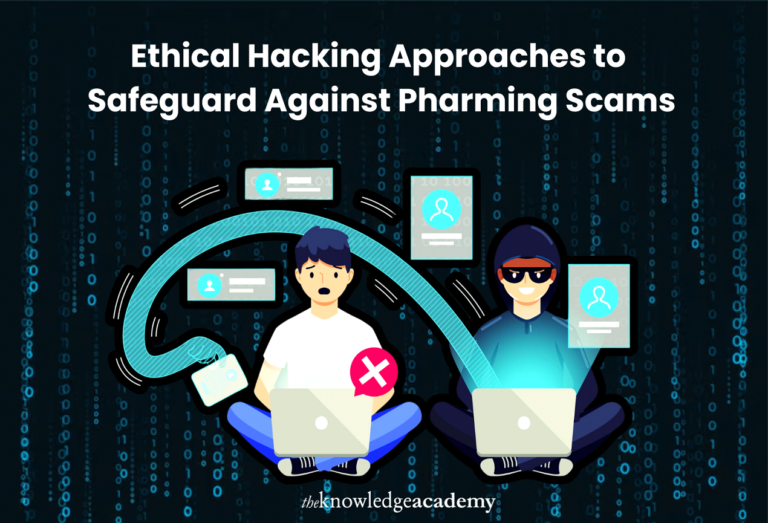Pharming is a growing cybersecurity threat that exploits users by diverting them from authentic websites to fake ones. Due to this harmful activity, professionals must understand and apply ethical hacking techniques to protect online environments.
An Ethical Hacking Course is a valuable resource for people as it provides the necessary skills and knowledge to combat this cyber threat. Let us understand What is Pharming and the methods by which ethical hacking could reduce cyber threats.
Pharming: The Silent Cyber Threat
Pharming is a strong cyber-attack technique for manipulating website traffic by sending users from authentic to false websites. Unlike phishing, which uses false emails or messages to fool users into disclosing private information, pharming runs subtly in the background.
It penetrates the device targeted with malware and changes the DNS (Domain Name System), redirecting it to a fraudulent website which may appear authentic. Due to its covert nature, it poses a major risk to online security, making it difficult to detect and combat.
How Ethical Hacking Can Prevent Pharming
Ethical hacking involves using techniques to detect and address security weaknesses. It is essential to prevent pharming by identifying problems in DNS configurations, network security, and user devices that could be exploited.
The following are some critical ethical hacking strategies to prevent pharming:
DNS Security Testing
DNS converts domain names into IP addresses, enabling users to access websites. DNS weaknesses are frequently the target of pharming attacks; therefore, it is necessary to protect this system. Ethical hackers conduct DNS security testing to identify and resolve issues.
They detect DNS cache poisoning, an issue in which attackers insert false data into a DNS cache, redirecting users to false websites. The risk of pharming attacks can be reduced by securing DNS configurations and implementing DNSSEC (DNS Security Extensions).
Network Vulnerability Scanning
Another approach to combating pharming is detecting vulnerabilities. Ethical hackers use special tools to systematically check networks for problems that attackers could use to divert network traffic. These evaluations can detect faults in routers, firewalls, and other network equipment that could be potential manipulation targets.
Ethical hackers carefully address and rectify reported problems to maintain network security and prevent users from being redirected to dangerous websites.
Malware Removal and Detection
Malware is used in pharming to compromise user devices or modify DNS settings. Ethical hackers are efficient at identifying and eliminating this malware, thereby guaranteeing device security. This process involves identifying unknown threats through behaviour-based detection and scanning for known malware signatures.
Ethical hackers can assist in preventing pharming attacks by conducting detailed scans and regularly updating anti-malware tools.
User Education and Awareness
One of the most effective strategies for preventing pharming is to educate people about the dangers and signs of potential risks. Ethical hackers partner with organisations to provide training programmes on identifying unusual behaviour, stopping malware, and maintaining secure browsing practices.
Adopting precautions such as establishing secure connections and verifying website URLs can significantly reduce the risks linked to pharming attacks. Moreover, ethical hackers should support the use of two-factor authentication (2FA) as a security measure.
Implementing Strong Encryption Protocols
Encryption is essential for safeguarding data from interception or manipulation. Ethical hackers advise implementing robust encryption protocols, particularly for DNS queries and responses. Encrypting these communications diminishes the risk of DNS spoofing and pharming attacks.
Organisations should guarantee that all data transmitted over their networks is encrypted, significantly reducing the risk of data alteration or interception by adversaries.
Web Application Security
Pharming attacks target web applications because they can access sensitive user information. Ethical hackers conduct comprehensive security assessments of web applications to identify and resolve dangers.
Securing web applications can prevent attackers from routing traffic to fraud sites or accessing user data. It also helps examine SQL injection, cross-site scripting (XSS), and other prevalent risks.
Monitoring and Incident Response
An organisation’s security strategy is incomplete without effective monitoring and a strong incident response plan. Ethical hackers help establish systems that monitor DNS activity, detect peculiar traffic patterns, and respond quickly to potential threats.
A well-prepared incident response team can rapidly restore normal operations, prevent further damage, and isolate the issue in case of a suspected pharming attack.
Conclusion
Pharming is an insidious and expanding danger that requires a proactive security strategy. Ethical hacking provides the tools and techniques needed to combat pharming effectively. An Ethical Hacking Course provides the knowledge and skills necessary to remain ahead of cyber threats for those who wish to specialise in this field. To enhance your knowledge, you should explore the courses provided by The Knowledge Academy, which offers a prosperous career guide in cybersecurity and ethical hacking.
Keep an eye for more latest news & updates on News24!

